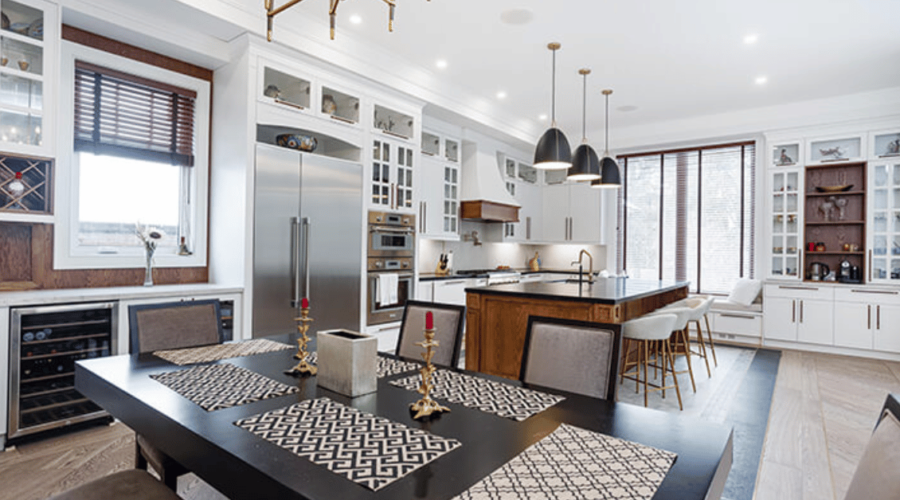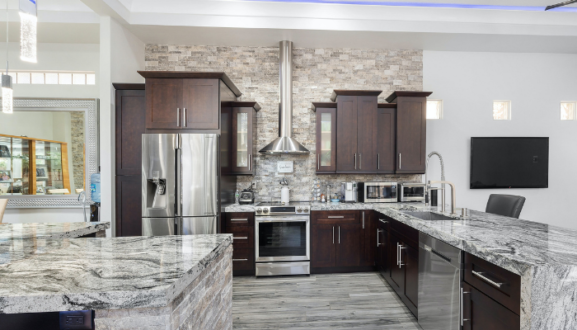Kitchen remodel contractors in Florida reviews
- What are the most common complaints about kitchen remodel contractors in Florida
- What are the most common hidden costs in Florida kitchen remodels
- How do the costs of kitchen remodels in Miami compare to those in Tampa
- What should I look for in a Florida contractor’s review to ensure they are reliable
- How do I verify the licenses and certifications of kitchen remodel contractors in Florida
- How can I ensure my Florida kitchen remodel project stays on schedule
- What should I do if my contractor doesn’t return my calls
- How can I protect myself from unlicensed contractors in Florida
- What are the legal remedies if my contractor damages my property
What are the most common complaints about kitchen remodel contractors in Florida
The most common complaints about kitchen remodel contractors in Florida are similar to those experienced nationwide. Here are the key issues:
- Project delays: Homeowners often complain that “The project took too long” or that they were “not given a schedule”.
- Poor workmanship: This includes issues such as scuffs, marks, missed paint spots, using lower quality materials than agreed upon, raised or exposed hardware, dents or cracks in drywall, and damaged installations.
- Communication problems: Many homeowners report that contractors “never call me back”.
- Messy work areas: Clients often complain that their “house and yard were a mess” during the remodeling process.
- Hidden costs: Unexpected expenses are a frequent source of frustration, with homeowners citing “So many hidden costs”.
- Incomplete work: Some contractors fail to finish the projects they were hired to do.
- Overcharging: Complaints about contractors overcharging for services or replacement parts are common.
- Property damage: Some homeowners report that contractors damaged their property while performing the job.
- Contract breaches: Violations of the terms outlined in the contract or written agreement are also frequent complaints.
- Lack of proper licensing: In some cases, homeowners discover they’ve hired unlicensed contractors, which can lead to various issues.
To protect themselves, Florida homeowners are advised to get multiple written estimates, check contractor licenses, and consider filing complaints with appropriate authorities if issues arise.
What are the most common hidden costs in Florida kitchen remodels
Hidden costs in kitchen remodels can significantly increase the overall budget if not accounted for in advance. Here are the most common hidden expenses:
1. Code Compliance and Upgrades
- Updating plumbing, electrical systems, or ventilation to meet current building codes can be costly. For example, moving a sink or appliance may require additional plumbing work to comply with regulations.
2. Structural Issues
- Discovering and addressing problems like water damage, mold, pest infestations, or unstable walls during demolition can lead to unexpected expenses. Repairs to load-bearing walls or damaged joists are particularly expensive.
3. Permits and Fees
- Permit fees are often overlooked. These vary based on the scope of construction and local regulations, adding hundreds or even thousands of dollars to the project.
4. Wiring and Electrical Work
- Adding new appliances or relocating existing ones may require rewiring or installing additional outlets. This can involve significant labor costs and materials.
5. Flooring Adjustments
- Changes to the kitchen layout, such as moving cabinets or islands, can expose areas of mismatched or missing flooring, necessitating either patchwork repairs or complete re-flooring.
6. Custom Cabinetry and Storage
- Custom cabinets or modifications to fit specific kitchen dimensions often cost more than pre-fabricated options.
7. Living Adjustments During Construction
- If the kitchen is unusable during remodeling, alternative arrangements like eating out or temporary kitchen setups can add unplanned costs.
8. Appliance Installation Fees
- Installation of appliances often comes with separate service fees, ranging from $100 to $800 depending on the appliance’s complexity.
9. Changing Plans Mid-Project
- Homeowners who change their minds about designs, materials, or layouts during construction may incur additional labor and material costs.
10. Hazardous Material Removal
- Older homes may contain asbestos, lead paint, or other hazardous materials that require professional removal services, which are expensive but necessary for safety compliance.
To avoid surprises, homeowners should plan thoroughly, include a contingency fund (typically 15–20% of the budget), and work with experienced contractors who can identify potential issues early in the process.
How do the costs of kitchen remodels in Miami compare to those in Tampa
The costs of kitchen remodels in Miami are generally higher than those in Tampa due to differences in labor rates, material costs, and market demand. Here’s a comparison:
Miami
- Cost Range: $20,500 to $106,000, depending on the size and scope of the remodel.
- Small Kitchen: $20,500–$71,000 for a full remodel.
- Medium Kitchen: $24,000–$75,000 for a mid-range remodel.
- High-End Remodels: Can exceed $106,000 for upscale finishes and major layout changes.
- Factors Driving Costs:
- Higher cost of living and demand for luxury finishes.
- Additional expenses like custom cabinetry and high-end materials.
- Permit costs and potential structural updates (e.g., plumbing or electrical upgrades).
Tampa
- Cost Range: $13,000 to $38,000 for most projects.
- Minor Updates: Around $13,000 for surface-level changes like painting and appliance upgrades.
- Major Renovations: Up to $38,000 for structural changes or custom solutions.
- Factors Driving Costs:
- Lower labor rates and material costs compared to Miami.
- Projects tend to align closely with national averages ($13,264–$37,500).
Key Differences
- Miami remodels are significantly more expensive, particularly for high-end projects or larger kitchens.
- Tampa offers more budget-friendly options but still provides flexibility for upscale renovations.
Homeowners should account for regional variations in labor costs and material availability when budgeting for a kitchen remodel.
What should I look for in a Florida contractor’s review to ensure they are reliable
When evaluating a contractor’s reviews to ensure reliability, look for the following key indicators:
- High overall rating: Seek contractors with ratings in the high 4s out of 5 stars across multiple review platforms.
- Historical reviews: Look for reviews dating back several years, indicating long-term credibility and industry presence.
- Consistency across platforms: Reliable contractors should have positive reviews across multiple review sites, strengthening their trustworthiness.
- Comprehensive reviews: Detailed reviews describing clients’ full experiences provide better insight into the contractor’s work quality and professionalism.
- Project descriptions: Reviews should include specific details about the scope of work, challenges faced, and how the contractor addressed them.
- Professionalism and communication: Look for mentions of the contractor’s punctuality, courtesy, and effective communication throughout the project.
- Workmanship quality: Reviews should highlight the contractor’s technical skills and the overall quality of their work.
- Adherence to timeline and budget: Positive reviews often mention the contractor’s ability to complete projects on schedule and within the agreed budget.
- Customer service and follow-up: Reliable contractors are often praised for their responsiveness and willingness to address client needs, even after project completion.
- Likelihood to recommend: Reviews indicating that clients would hire the contractor again or recommend them to others are strong positive indicators.
- Transparency: Look for reviews mentioning clear, detailed contracts and open communication about pricing and project details.
- Problem-solving skills: Positive reviews often highlight how contractors effectively addressed unexpected issues or challenges during the project.
By focusing on these aspects in contractor reviews, you can better assess their reliability and make an informed decision for your project.
How do I verify the licenses and certifications of kitchen remodel contractors in Florida
To verify the licenses and certifications of kitchen remodel contractors in Florida, follow these steps:
- Use the Florida Department of Business and Professional Regulation (DBPR) Website:
- Visit the DBPR’s online license search portal at MyFloridaLicense.com.
- Search for the contractor by their name or business name to confirm their license status, expiration date, and any disciplinary actions.
- Request the Contractor’s License Number:
- Ask the contractor directly for their state-issued license number. Use this to cross-check their credentials on the DBPR website.
- Check for Local Licensing Requirements:
- Some counties, like Collier County, have additional licensing regulations. Contact the local Contractor Licensing Section to confirm whether the contractor is licensed in your area.
- Verify Insurance Coverage:
- Request a Certificate of Insurance (COI) from the contractor to ensure they carry liability insurance and worker’s compensation coverage. Confirm its validity with the insurance provider.
- Confirm Continuing Education:
- Licensed contractors in Florida must complete continuing education courses to renew their licenses. This ensures they stay updated on building codes and regulations.
By following these steps, you can ensure that your contractor is properly licensed, insured, and qualified for your kitchen remodeling project.
How can I ensure my Florida kitchen remodel project stays on schedule
To ensure your kitchen remodel project stays on schedule, follow these key strategies:
1. Create a Detailed Plan
- Develop a comprehensive plan that includes the design, materials, and timeline. Work with a contractor or designer to finalize all details before starting the project.
2. Set a Realistic Timeline
- Establish a clear schedule for each phase of the remodel, from demolition to completion. Factor in lead times for materials and permits, and build in buffer time for unexpected delays.
3. Choose Reliable Professionals
- Hire experienced contractors and tradespeople with proven track records of completing projects on time. Communicate your timeline expectations upfront and ensure everyone is aligned.
4. Order Materials in Advance
- Select and purchase all materials, appliances, and fixtures before construction begins to avoid delays caused by backorders or shipping issues.
5. Maintain Open Communication
- Regularly check in with your contractor and team to monitor progress. Address any issues or deviations from the schedule promptly to prevent delays.
6. Stick to the Original Scope
- Avoid making significant changes to the design or scope during construction, as this can lead to delays and additional costs.
7. Coordinate Tradespeople Efficiently
- Work with your contractor to schedule plumbers, electricians, carpenters, and other tradespeople in a logical sequence to minimize downtime.
8. Monitor Progress Regularly
- Stay actively involved by visiting the site frequently and reviewing progress against the timeline. This allows you to identify potential issues early and address them quickly.
9. Plan for Contingencies
- Allocate extra time and budget (typically 10–15%) for unexpected problems, such as structural issues or material shortages.
By following these steps, you can minimize disruptions and keep your kitchen remodel project on track for timely completion.
What should I do if my contractor doesn’t return my calls
If your contractor isn’t returning your calls, here are several steps you can take:
- Determine Their Preferred Contact Method: Defer to the contractor’s preferred method of communication, whether it’s a phone call or text. A busy contractor might find texting quicker than listening to a voicemail.
- Send a Letter to Perform: If calls go unanswered, send a formal “Letter to Perform” via email and regular mail[2]. This letter should professionally and objectively state what the contractor has failed to do and set a reasonable deadline for completion.
- Send a Second Notice: If there’s no response by the first deadline, send a second email and letter, shortening the performance time period. Inform the contractor that you may need to terminate the agreement and hire someone else if progress isn’t made.
- File a Complaint with the Licensing Board: If the contractor is licensed, file a complaint with your state’s contractor licensing board. The board can contact the contractor and potentially threaten to revoke their license, prompting a response.
- Consider Legal Action: If attempts to communicate and negotiate fail, consider consulting with an attorney to explore legal options, especially if there was a written contract. With only a verbal agreement, you may have to go to small claims court.
- Resend Invoices and Document Work: Resend copies of invoices and take photos of the work completed. If your tools are at the job site, you are allowed back on the property. If not, call the police.
- In-Person Meeting: Go to the contractor’s house for a face-to-face meeting to discuss the issue.
How can I protect myself from unlicensed contractors in Florida
To protect yourself from unlicensed contractors in Florida, follow these steps:
1. Verify Licenses
- Use the Florida Department of Business and Professional Regulation (DBPR) website (myfloridalicense.com) to check if the contractor is properly licensed.
- Ensure the license is valid, up-to-date, and appropriate for the type of work being performed.
2. Look for Red Flags
Be cautious of contractors who:
- Ask you to obtain permits on their behalf.
- Require large upfront payments.
- Claim permits or inspections are not needed.
- Only provide verbal agreements and refuse to sign a written contract.
- Lack proof of insurance for general liability and workers’ compensation.
3. Obtain Written Estimates
- Request at least three written and itemized estimates that clearly outline the scope of work, materials, costs, and timelines.
4. Check for Proper Documentation
- Ensure the contractor displays their license number on contracts, estimates, promotional materials, and vehicles as required by Florida law.
- Confirm they provide a certificate of insurance for liability and workers’ compensation coverage.
5. Avoid Paying Large Deposits
- Never pay the full amount upfront. Instead, structure payments based on project milestones to ensure work is completed as agreed.
6. Review Contracts Carefully
- Have a trusted attorney or professional review the contract before signing. Ensure it includes all necessary disclosures, such as lien law and recovery fund information required by Florida law for contracts over $2,500.
7. Report Unlicensed Activity
- If you suspect unlicensed activity, report it to the Florida DBPR’s unlicensed activity hotline at 866-532-1440.
By following these precautions, you can minimize risks and ensure your project is handled by qualified professionals.
What are the legal remedies if my contractor damages my property
If your contractor damages your property, you have several legal remedies and steps to take to resolve the issue:
1. Document the Damage
- Take detailed photographs and videos of the damage as soon as it is discovered.
- Keep a written record of all communications with the contractor, including emails, texts, and call logs.
- Preserve copies of contracts, invoices, and receipts that outline the scope of work.
2. Notify the Contractor
- Contact the contractor immediately to inform them of the damage.
- Be polite but firm and provide evidence of the damage (e.g., photos or videos).
- Request a plan for resolving the issue, such as repairs or compensation.
3. Review Your Contract
- Check your contract for clauses related to liability, insurance, and dispute resolution.
- If the contract specifies that the contractor is responsible for damages, use this as leverage in discussions.
4. File an Insurance Claim
- Request the contractor’s liability insurance information and file a claim with their insurer. Most reputable contractors carry general liability insurance that covers property damage caused during work.
- If the contractor is uninsured or their insurance denies your claim, check whether your homeowners’ insurance policy covers contractor-caused damage.
5. Seek Legal Remedies
If informal resolutions fail:
- Breach of Contract Claim: File a claim if the contractor violated terms outlined in your agreement.
- Negligence Claim: Pursue this if you can prove that the contractor failed to act with reasonable care, directly causing the damage.
- Small Claims Court: For minor damages, you can file a claim in small claims court without needing an attorney.
- Civil Lawsuit: For significant damages, consult a construction defect attorney to file a lawsuit seeking compensation for repair costs, temporary housing, or other related expenses.
6. Report to Licensing Authorities
- If the contractor is licensed in Florida, file a complaint with the Florida Department of Business and Professional Regulation (DBPR). This could prompt disciplinary action against them.
7. Prevent Future Issues
- Always hire licensed and insured contractors.
- Include specific clauses in contracts about liability for property damage and dispute resolution processes.
By following these steps, you can protect your rights and seek appropriate remedies for any property damage caused by your contractor.



